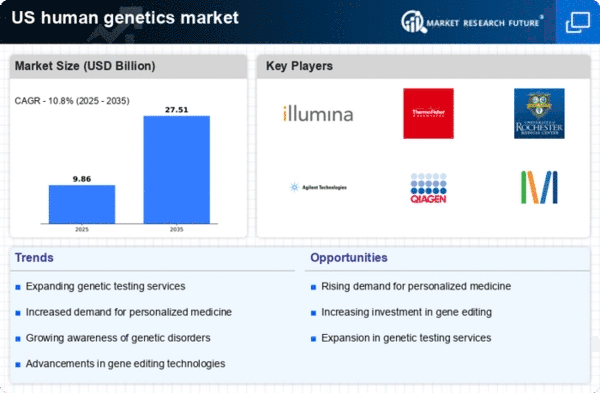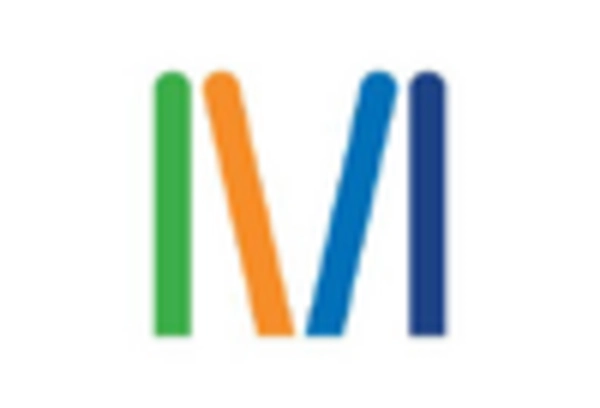Expansion of Genetic Testing Services
The expansion of genetic testing services is a key driver of growth in the human genetics market. With the increasing availability of direct-to-consumer genetic tests and the integration of genetic testing into routine healthcare, more individuals are opting for genetic assessments. This trend is supported by advancements in technology that allow for rapid and cost-effective testing. As of 2025, the market for genetic testing services is projected to exceed $10 billion, driven by demand for carrier screening, prenatal testing, and hereditary cancer testing. Furthermore, healthcare providers are recognizing the value of genetic testing in guiding treatment decisions and improving patient outcomes, which is likely to further stimulate the human genetics market.
Growing Awareness of Genetic Disorders
There is a rising awareness of genetic disorders among the general population, which is contributing to the expansion of the human genetics market. Educational initiatives and advocacy groups are playing a crucial role in informing individuals about the implications of genetic conditions and the importance of genetic testing. As awareness increases, more individuals are seeking genetic counseling and testing services, leading to a higher demand for genetic diagnostics. In the US, it is estimated that approximately 1 in 4 individuals may be affected by a genetic disorder, underscoring the need for effective screening and management strategies. This heightened awareness is likely to drive investments in genetic research and testing services, further propelling the human genetics market.
Regulatory Support for Genetic Research
Regulatory frameworks in the US are increasingly supportive of genetic research, which is fostering growth in the human genetics market. Government agencies, such as the National Institutes of Health (NIH) and the Food and Drug Administration (FDA), are providing funding and guidance for genetic studies and clinical trials. This support is crucial for the development of innovative genetic therapies and diagnostic tools. As of 2025, federal funding for genetic research has reached approximately $3 billion annually, reflecting a commitment to advancing the field. Additionally, streamlined regulatory processes for genetic testing and therapies are likely to encourage more companies to enter the market, thereby enhancing competition and innovation within the human genetics sector.
Increasing Demand for Personalized Medicine
The human genetics market is experiencing a notable surge in demand for personalized medicine, driven by advancements in genetic research and technology. Patients increasingly seek tailored treatment options based on their genetic profiles, which can lead to more effective therapies and improved health outcomes. According to recent estimates, the personalized medicine sector is projected to reach approximately $2 trillion by 2025, indicating a robust growth trajectory. This trend is likely to propel the human genetics market as healthcare providers and pharmaceutical companies invest in genetic testing and analysis to develop customized treatment plans. Furthermore, the integration of genetic insights into clinical practice is expected to enhance patient engagement and adherence to treatment protocols, thereby fostering a more patient-centric approach in the healthcare landscape.
Technological Advancements in Genetic Sequencing
Technological innovations in genetic sequencing are significantly impacting the human genetics market. The advent of next-generation sequencing (NGS) technologies has drastically reduced the cost and time required for genetic analysis, making it more accessible to both researchers and clinicians. As of 2025, the cost of sequencing a human genome has decreased to around $1,000, facilitating widespread adoption in clinical settings. This democratization of genetic testing is likely to drive growth in the human genetics market, as healthcare providers increasingly utilize these technologies for diagnostics, disease prevention, and treatment planning. Moreover, advancements in bioinformatics tools are enhancing the ability to interpret complex genetic data, further supporting the integration of genetic information into routine healthcare practices.

















